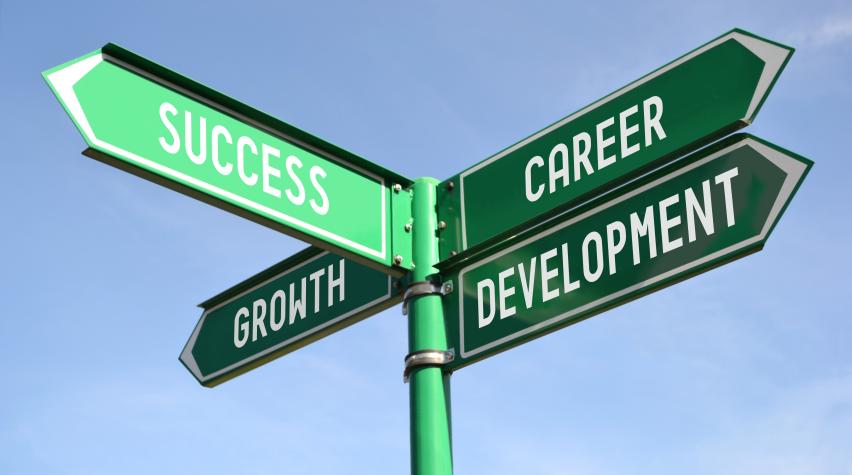
Earning a living, achieving optimal work-life balance, and cultivating happiness can all depend on finding the right job or career. This article explores what it means to forge a career path and offers advice from seasoned engineers.
Career beginnings
Finding that first job out of college is no easy feat. If you are an undergraduate student, it can be valuable to attend your university’s career fairs. C. Thomas Sciance, a retired Adjunct Professor at the Univ. of Texas, notes, “when I graduated, there were many companies signed up with the school wanting to interview students. The interview might result in an invitation to visit the sites, and the result would usually be an offer.”
Gary April, a retired professor from the Univ. of Alabama, suggests that there is no wrong first job. “The real question might be ‘how do I make my first job a learning experience?’” he says. In the first position you accept, find ways to cultivate a learning environment. “You will be able to better assess your future from a much wider base of knowledge after the first job. Make the most of it,” says April.
Career progression
Once you begin your career, you may decide to follow a traditional career path (read the CEP article, “Career Paths for Chemical Engineers,” p. 16, Feb. 2018). These career paths may include work in the oil and gas, chemical, or pharmaceutical industries as a research, process development, or production engineer, with future promotions to supervisory, management, and executive positions. However, many chemical engineers don’t go into management and instead progress their careers in technical positions. Arthur Etchells, an independent consultant, states, “I worked for many years at DuPont as an internal consultant and did well rising to the highest technical position.”
Give it 100%
You will likely have the most success if you invest in your career and do your best. “I think academic success, hard and efficient work, right ideas at the right time, and perseverance lead to the right job,” says Chris Harding, now retired. “As an example, I was hired by Abbott Laboratories for common process validation, and I worked hard, worked intelligently, and was awarded three vice-president’s awards in 14 months. This success was my ticket to finding work that I was interested in.”
“Wherever you land, give it 100%,” says Gary April. “Tasks or projects are developed for the company to realize success (profit), but each one provides you with a learning moment, a chance to add new skills to your résumé or refine some others you have acquired.”
Be open to change
Just as we are continually growing and changing, your career may also develop and flourish in unexpected ways. Bob Zumwalt, a retired chemical engineer, decided to go into industry after graduating with his BS, rather than attending graduate school as his professors urged him to do. “I had been in school for 16 years and wanted to do something with what I had learned,” says Zumwalt. He signed on with the process design group at Dow Chemical’s plant in Freeport, TX. He fully intended to continue with process design, but his interest was later piqued by a course he took called “Application of Differential Equations to Chemical Engineering Problems.” The course inspired him to pursue a PhD, which in turn led him to a career of mathematical modeling and dynamic simulation. “My first assignment, developing an analog simulation of the catalytic cracker and computer control for the unit, was a big career builder,” says Zumwalt. “This led to a fabulously interesting series of assignments as a technical specialist, such as at a French refinery and at the London engineering office.”
My recommendations
I recommend regularly taking time to evaluate your goals, skills, experiences, and values as you advance in your career. If you are unhappy in your career, evaluate if it is your job, your career choice, or your personal situation. (There are books on this subject with exercises to help you to do this, such as What Color is Your Parachute? by Richard Nelson Bolles.)
In my career, I started in research for Mobil Chemical and while there, I relocated four times in ten years to New Jersey and Florida. I liked my work in research, earned a patent, was promoted four times, and became a statistics and computer expert, and later a planning analyst. However, when Mobil changed CEOs, they laid off many of their planning analysts, including my boss and me. I then worked for four years for ABB in process optimization, but when I finished my project, I was laid off due to lack of work. I moved to Georgia and worked for a tobacco company for eight years, where I was promoted to a senior technical position. When they offered all the chemical engineers in the company a buy-out, I reevaluated my situation, and I realized that I had become unhappy in my job and career.
At that time, I had a friend — a résumé writer and career coach — who offered to help me with my job search if I would help her with her website. During that process, I became interested in career coaching and I decided to become a résumé writer and career coach from that point on.
In the end, you spend most of your waking time in your job, so it is important to be happy in what you do.
Robin Schlinger has over 20 years of experience as a résumé writer and career coach. She holds a BS in chemical engineering from the Massachusetts Institute of Technology (MIT).
This article originally appeared in the Career Connection column of the June 2022 issue of CEP. Members have access online to complete issues, including a vast, searchable archive of back-issues found at aiche.org/cep.

